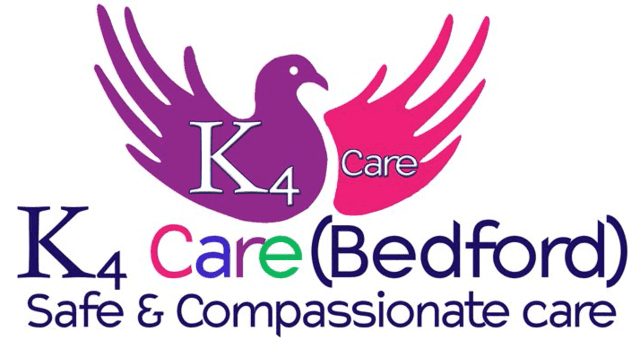01234 272 800 or 01234 327 383
| info@k4carebedford.com
FAQs
Respite care in Bedford
K 4 Care believes in and actively strives to help promote full lives of our clients. Our aim is to aim the highest of level dedicated care, delivered with compassion and understanding. All of our work is carried out with the view of encouraging independence, whilst maintaining the highest level of dignity and privacy.
Customised care services

Our support team are qualified and experienced in providing care and support for patients with dementia and physical disabilities. Contact us today if you would like to start your career
as a support worker.
Can we choose the support workers?
We always start any caring relationship with an initial home visit. An in-depth assessment is the best way to get to know people’s needs and preferences so we can then match them with a suitable support worker. Feedback can help fine-tune the process of person centred planning.
Services offered:
Personal Care:
- Washing, shaving and hygiene
- Dressing
- Continence care
- Management of medication such as administration
- Mobility assistance
- Monitoring of appropriate diet
Social Care:
- Coordinating GP visits, and other professional attention
- Social inclusion
- Entertainment and hobbies
- Providing an escort for events, church etc
- Help with pets
Specialised Care:
- End of life assistance (palliative care)
- Dementia care
- Reablement
- Convalescent care
- Autism
- Cerebral Palsy
- Epilepsy
- Parkinson's disease
- Stroke
- Speech impairment
- Visual impairment
Do you provide end-of-life care?
Yes we can provide end of life care and support. Most people would prefer if possible to end their days in their own homes. It is helpful to have experienced support workers in the home. If you wish to discuss end-of-life issues and the support we can provide, please let us know during our initial home visit. Our support workers can provide reassurance that your loved one will be respected at all times and will liaise with their office, so that you are updated regularly if anything changes.
How do you monitor the support workers?
When your support worker visits, they are supervised in your home regularly via spot checks to make sure everything is meeting the care needs. You can call any time to request a supervisor’s visit if you have any concerns.
I am worried my carer won't turn up on time?
We use a high-tech monitoring system, Live Call monitoring which provides your relation with the reassurance that they are receiving the agreed amount of care at the time they need it. This allows us to check that your relation's support worker has arrived on time. If there is an unavoidable delay, everyone is kept fully informed.
What checks do you make on your support workers before they visit people?
All our support workers are highly trained and then shadow until they are fully confident and understand the clients needs. We then make regular spot checks as this part of our supervision process. We also carry out enhanced Disclosure and Barring Services Checks. As our relationship with our clients continues, we check regularly that all is going well. Every client is telephoned and visited by our experienced field supervisors. We gather feedback, to make sure we are doing what is needed and expected.
What happens when a support worker is sick or on holiday?
Continuity of care is important to us. We always introduce our clients to a small pool of support workers. Procedures are in place for when people are on holiday or sick to ensure continuity of care.
What is an enhanced Disclosure and Barring Service check (DBS)?
To protect vulnerable people, the government set up the Criminal Records Bureau, now known as the Disclosure and Barring Service, which is an executive agency of the Home Office, in March 2002. The DBS checks the backgrounds of applicants for work with vulnerable groups for any relevant criminal records or other problems.
Any individual or organisation that cares for or is in regular contact with vulnerable groups is required by law to have Standard and Enhanced disclosures. This includes teachers, nurses, carers and even people working on a one-off basis volunteering for a charity for instance.
All our support workers have enhanced DBS checks, which means further research has been done into their backgrounds to check on other issues.
What is the minimum level of support you provide?
All care is based on an assessment, which we will determine the level of support needed.
What training do your support workers receive?
Our support workers receive thorough induction training to our high standards, covering the mandatories which are: Moving and Handling, Health and Safety, Infection Control, Fire Awareness, Medication, Safeguarding Adults, Safeguarding Children, First Aid, Mental Capacity, Promotion of Dignity, Promotion of Equality & Diversity, K4 Care Values and Literacy and Numeracy. All support workers are fully tested, assessed and certified before they can visit a customer’s home. Further training will also be provided to meet any specialist needs.
Can you help me to talk to my relation about needing more care as they get older?
It can be difficult for people to accept that they are not coping on their own as they get older, and broaching the subject of accepting more help can be uncomfortable. We are very experienced in supporting families with these kinds of conversations.
Do you provide qualified nursing care?
We don't send trained nurses into our clients' homes at present, however we work alongside multi agencies who we liaise with on a regular basis.
Do your support workers cook fresh food from scratch?
We will discuss your requirements during our assessment so your needs are fully met. Nutritious meals are vital to wellbeing, and our support workers will prepare food that suits everyone's requirements.
What should I do if I don’t get on with my support worker or have a complaint?
The first thing to do is get in touch with management as soon as you feel there is a problem, and one of our managers will come and visit you as a matter of urgency to work with you towards a solution.
We will always respond quickly to any requests for change or complaints.
Do you provide dementia care?
We will always ensure our support workers’ are highly trained to the needs of your loved one. Please do discuss any special requirements during our assessment and we will let you know what we can do to help. We have a great deal of experience in looking after dementia patients.
If you find that your loved one is showing signs of dementia, it can be a very difficult time. People report that they feel they are losing the person they love. Having the assistance of a trained support worker can be very reassuring to friends and family at this time.
For dementia sufferers, being able to remain in their own homes and surrounded by their familiar possessions can make a real difference to their wellbeing. Our support workers are trained to support people in their own homes.
How do you recruit and select support workers?
We take great care in selecting and recruiting. All support workers undergo a rigorous screening and interview process and are cleared to work following an Enhanced Disclosure and Barring Service check plus 2 employment references. They are fully trained and accompanied by a field supervisor to mentor them when they begin working.
What kind of people do you employ as support workers?
We select people who are passionate about caring, and bring K4 Care values to everything they do. Dignity, choice and independence are their goals for all their clients. They are hand-picked to provide the best possible care and we support their work with appropriate management and training throughout their time with us. Communication is very important to us. We work as a team so will introduce the client to more than one support worker. This means they will already be familiar with other support workers.
I live a long way away from my relation and I worry about their welfare. What services do you provide to help me keep an eye on them?
We are very experienced at dealing with long distance relationships. Please do feel free to call and discuss your thoughts about your relation and their care. We always like to start the caring relationship with an assessment, so we can meet you and your relation and understand their needs.
How much does care in a person's home cost?
Although we can give initial guidelines over the telephone when you call us.
Does live-in care mean 24 hour coverage?
No, but we can provide a team to cover days and nights if that is what is needed. Live-in care means that the support worker is around the house, and we all agree what level of support is needed.
For respite care, call K4 Care (Bedford) Ltd on
Contact Us
Thank you for contacting us.
We will get back to you as soon as possible
We will get back to you as soon as possible
Oops, there was an error sending your query.
Please try again later
K4 Care (Bedford) Ltd
131 Midland Road, Bedford, MK40 1DN
Share
Tweet
Share
Mail
© 2024. The content on this website is owned by us and our licensors. Do not copy any content (including images) without our consent.



